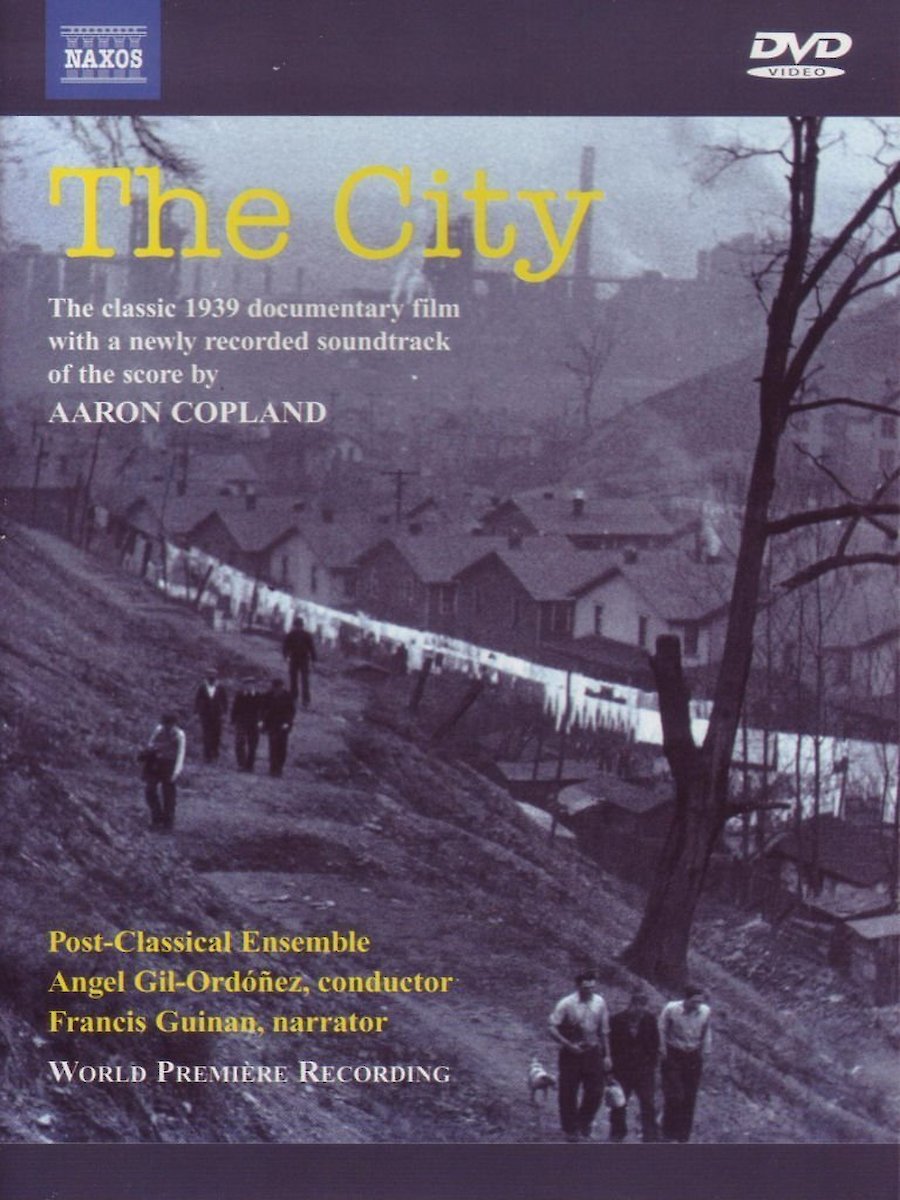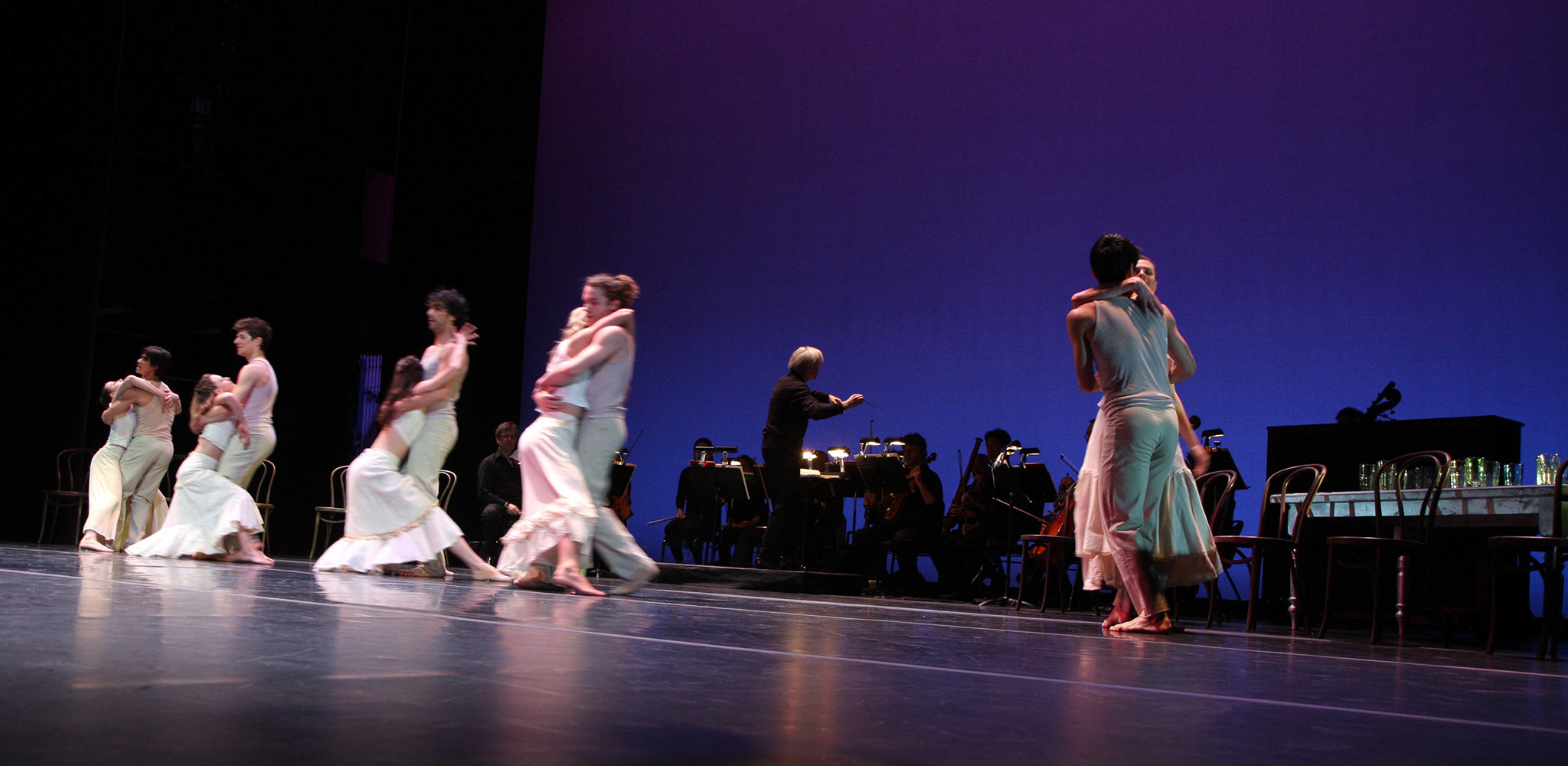Aaron Copland: The City (DVD)
Summary

The crisp new recording sounds great (…) it’s a worthwhile recording that deserves watching more than once.
Anne MidgetteThe Washington Post
The newly recorded soundtrack is largely excellent, with the PostClassical Ensemble exemplifying the understated, light, and precise style of playing needed for Copland’s music.
Emily AnsariAmerican Music
A fascinating disc, and highly recommended.
Chris MullinsOpera Today
The classic 1939 documentary film with a newly recorded soundtrack. Made for the 1939 New York World’s Fair (The World of Tomorrow), The City is a seminal documentary film distinguished for the organic integration of narration (scripted by city planner Lewis Mumford), cinematography (Ralph Steiner and Willard Van Dyke), and music (Aaron Copland).
Reviews
PostClassical – Copland and the Cold War
This two-part podcast about Copland and the Cold War is part of PostClassical, a bi-monthly program that features performances by PCE’s music director Angel Gil-Ordóñez and artistic director Joseph Horowitz. Each program is thematic and reshapes the classical music experience through music and discussion. Bill McGlaughlin, host of Exploring Music, co-hosts with Horowitz and Gil-Ordóñez. These programs are recorded at Digital Island Studios in New York City and produced at the studios of WWFM – The Classical Network.
Review: The City by Lewis Mumford; Ralph Steiner and Willard von Dyke; Aaron Copland
The newly recorded soundtrack is largely excellent, with the PostClassical Ensemble exemplifying the understated, light, and precise style of playing needed for Copland’s music. The striking saxophone solos are particularly evocative and compare very favorably to their counterparts on the original recording. (Such comparisons are easily made, since the DVD also includes the entire film with the original soundtrack as a bonus feature.)
Images et sons au service de Roosevelt
The reissue of these documentaries, accompanied by a superb restoration of the black and white image, is accompanied by a new recording of texts and scores (also available on two separate CDs). Nostalgics can watch the original version of the films and their soundtrack. Exciting discussions complete this work and remind us of the time of hope and social progress that were the Roosevelt years.
Aaron Copland's score for The City
This disc neatly captures a central dichotomy of the career of composer Aaron Copland. Raised in New York City, Copland gained his greatest successes with scores that extol a rural, bucolic vision of American life. Appalachian Spring, Rodeo, Billy the Kid — compositions that present an idealized, perhaps even sentimentalized portrayal of a boisterous, green America, while containing enough musical sophistication and imagination to remain perpetually fresh. One of the composer’s early forays into film composition came when he was asked to score a 45 minute documentary called The City, which is in effect an advertisement for Lewis Mumford’s planned community, Greenbelt. Before the filmmakers (Ralph Steiner and Willard Van Dyke) turn their film over to a rapturous hymn to Greenbelt, they set the stage by contrasting the virtues of country living with the veritable hell of city life, circa 1939 — the very city life that produced Aaron Copland.
The City
Copland’s score features contrasting musical styles to support the on-screen images and rhetoric. Idyllic rural and suburban life is represented by pastoral, consonant music, while urban conditions are shown to dissonant, rhythmically jarring portions of the score. Additionally, there is often a strong physical correlation between specific images and musical figures, such as the clarinet triplet passage that plays while the viewer is shown a water wheel. The new recording of the score surpasses the original in many respects. There is greater dynamic range, more detail of orchestral color, and in general, the score works better as abstract music in the hands of the PostClassical Ensemble.
The City. El film documental clásico de 1939 con una nueva banda sonora de la partitura de Aaron Copland
This DVD allows us to see that same film, but now with a soundtrack that sounds like one would expect in a modern production, with the quality that corresponds to those images, of disturbing beauty –evocative images of a world that no longer exists, although in reality it was not quite so. Ángel Gil-Ordóñez and the PostClassical Ensemble give artistic and sonorous quality to this little-known score of Copland the the cinematographer, a wide-ranging score, an authentic masterpiece of the specialty, which is better to hear with the images for which it was composed.
Classical Releases: 'The City,' Mahler and Beethoven With Washington Roots
Following their remastering of Pare Lorentz’s earlier The Plow That Broke the Plains and The River, with music by Virgil Thomson –films that influenced The City considerably– the PostClassical Ensemble has given this Copland score its first modern recording (conducted by Angel Gil-Ordóñez) and issued it on a bountiful DVD that includes a version of the film with the original soundtrack, a discussion between Joseph Horowitz and the filmmaker George Stoney, and a documentary about Greenbelt.
About this recording
Program / tracklist
The score, arguably Copland’s highest achievement in film, was also his ticket to Hollywood; it has been called “an astonishing missing link not only in the genesis of Copland’s Americana style but in American music and cinema” (Mark Swed, The Los Angeles Times ). As the film contains no dialogue, it is possible to create a fresh soundtrack and discover musical riches inaudible on the original monaural recording. As Copland created no suite from The City, the present DVD at the same time marks the World Première recording of this music in its entirety.
Recorded at Dekelboum Concert Hall, Clarice Smith Performing Arts Center at the University of Maryland, College Park, on October 15, 2007.
- Picture format: NTSC 4:3
- Sound format: Dolby Digital / DTS Surround
- Region code: 0 (worldwide)
- Running time: 132 minutes
Bonus material:
- The City with the original soundtrack (1939 – 43:40), featuring narrator Morris Carnovsky and an orchestra conducted by Max Goberman.
- Which Playground for your Child: Greenbelt or Gutter? (2000 –15:09), a documentary film from the Greenbelt Museum featuring interviews with three Greenbelt “pioneers.”
- George Stoney in conversation with Joseph Horowitz (2007 – 29:15), a legendary documentary filmmaker revisits The City.
Artists
- Francis Guinan, narrator
- PostClassical Ensemble
- Angel Gil-Ordóñez, conductor
Discography menu
- Revueltas: Redes / Copland: The City. 2 Classic Political Film Scores
Released in March 2022 - Bernard Herrmann (1911–1975): Whitman – Souvenirs de voyage – Psycho: A Narrative for String Orchestra
Released in October 2020 - Falla: El amor brujo (1915 original version) / El retablo de Maese Pedro
Released in May 2019 - Lou Harrison: Violin Concerto / Grand Duo / Double Music
Released in April 2017 - Silvestre Revueltas: Redes (DVD)
Released in May 2016 - Dvořák and America
Released in June 2014 - Xavier Montsalvatge: Madrigal sobre un tema popular / 5 Invocaciones al Crucificado / Folia daliniana
Released in January 2014 - Aaron Copland: The City (DVD)
Released in January 2009 - Virgil Thomson: The Plow That Broke The Plains • The River (CD and DVD)
Released in January 2007 - Los Sueños de Manuel de Falla
Released in September 2000 - El Abuelo
Released in December 1998 - Música Contemporánea
Released in April 1996 - Film Music by Manuel Balboa
Released in January 1995

